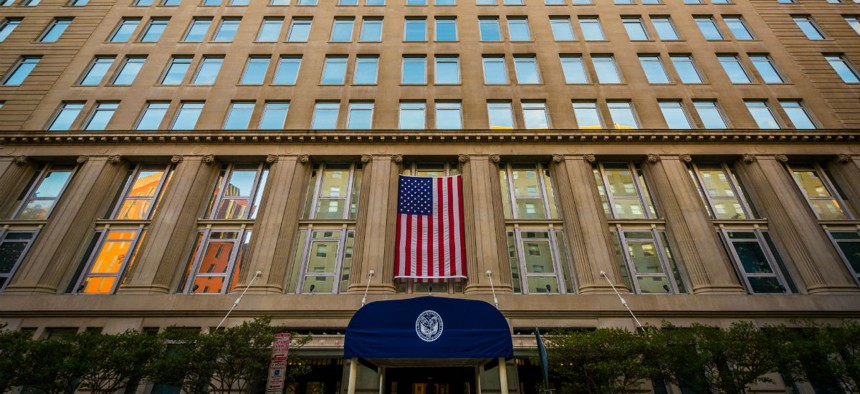
VA headquarters in Washington.
Federal Union Accuses VA Official of Illegal Taping of Deliberations
Labor and management had been negotiating over a provision that bars the recording of bargaining discussions.
A federal employee union on Wednesday accused the management negotiating team at the Veterans Affairs Department of surreptitiously recording the union negotiators’ private conversations.
Last week, National Federation of Federal Employees officials met with VA's management representatives in Atlanta for discussions over which parts of an existing collective bargaining agreement would be reopened for revision. During the morning session, the union asked for five minutes alone to go over a VA counterproposal, which management granted, said NFFE associate general counsel Suzanne Summerlin.
“So during that time, Vickie Charles, who is a member of our VA Council bargaining team, walks to the other side of the room to throw away a piece of trash, and when she did that, she heard a phone buzzing on the table,” Summerlin said. “So she looked down, and she saw there was a big red flashing ‘Record’ button, and it showed that the audio recorder from the iPhone was active, and rolling past 43 minutes.”
The parties had been going over Article 8 of NFFE’s contract with the department, which governs collective bargaining agreement negotiations, and contains a provision prohibiting the electronic recording of any aspect of negotiations. Summerlin said the incident completely derailed the day’s proceedings.
“I was so shocked,” she said. “I have never heard of this happening, where management was surreptitiously recording during a private caucus. It’s so beyond the pale, so egregious as to be fantastical. The idea that this would occur is outrageous. It’s a violation of the privacy of every VA employee in that room, and my privacy as an attorney protected by privilege in discussions with union officers and employees. It’s just unheard of.”
A VA spokesperson said the department would not comment due to pending litigation. Summerlin said that when confronted with the phone, the department’s attorney apologized and said she was unaware that the meeting was being recorded. Later in the day, lead VA negotiator Robyn Stanton returned with a woman Summerlin declined to name but described as an “HR professional,” who asked for her phone back.
“I looked at her and said, ‘Have you been doing this for the entirety of these bargaining sessions?’” Summerlin said. “Robyn interjected and said, ‘I won’t let her answer your question.’”
Summerlin said that later, the person who recorded the bargaining session and the private caucus apologized and suggested she did not know electronic recordings were prohibited.
“Her apology consisted of two main thoughts: First was, ‘I’m sorry if anyone was offended,’ as if she didn’t know it was illegal,” Summerlin said. “And then she said, ‘This is just how I take my notes, because I’m a perfectionist.’ This was clearly a practice she had regularly engaged in.”
Since last Thursday, NFFE has requested an investigation by the VA Office of the Inspector General, and it has filed three unfair labor practice charges with the Federal Labor Relations Authority. One is over the recording of negotiation sessions and private discussions subject to attorney client privilege, and two others claim the department has engaged in bad faith bargaining.
“Early last week, [Stanton] made it clear in both actions and in her words that they would not agree to anything that is not already required of them by statute,” Summerlin said. “If that’s the case, what is the point of a contract, which at basic essence is a private agreement between two parties to create a series of obligations and rights beyond what the law says you have to do? This is just bad faith bargaining.”
Agency officials also have insisted that every meeting with NFFE for negotiations take place in Atlanta, despite the fact that the ground rules, agreed to by both parties, dictate that the location alternate between Atlanta and Washington.
Summerlin said that at best, last week’s incident reflects a failure in VA management to treat labor-management relations with the proper seriousness.
“If their excuse is that she didn’t know any better, then to me, that implicates the inability of the chief negotiator and the attorney to lead their team in good faith negotiations with the union,” she said. “She should have damn well known better, because it’s in black and white in front of her in the contract and the ground rules, and the VA is responsible for training its team how to negotiate in good faith and not break the law. Someone knew, or should have known this was happening.”
The next session of negotiations is slated for two weeks from now Summerlin said, and management is again insisting that it take place in Atlanta.







